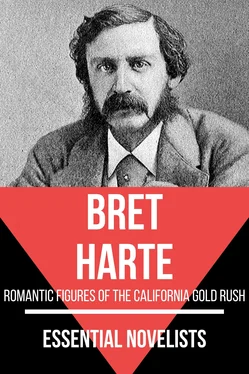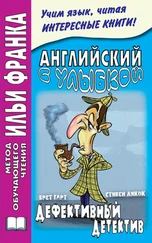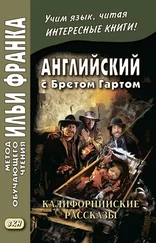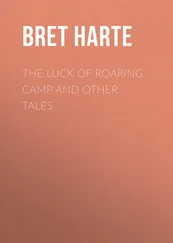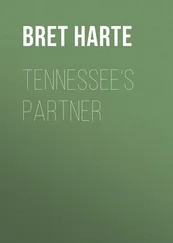Perhaps it was as well that the gossips of San Antonio did not know how imminent was their danger, or how closely imperilled were the vast social interests of the pueblo on the 3rd day of June 1854.
It was a bright, clear morning—so clear that the distant peaks of the San Bruno mountains seemed to have encroached upon the San Antonio valley overnight—so clear that the horizon line of the vast Pacific seemed to take in half the globe beyond. It was a morning, cold, hard, and material as granite, yet with a certain mica sparkle in its quality—a morning full of practical animal life, in which bodily exercise was absolutely essential to its perfect understanding and enjoyment. It was scarcely to be wondered that the Donna Maria Sepulvida, who was returning from a visit to her steward and major-domo, attended by a single vaquero, should have thrown the reins forward on the neck of her yellow mare, "Tita," and dashed at a wild gallop down the white strip of beach that curved from the garden wall of the Mission to the Point of Pines, a league beyond. "Concho," the venerable vaquero, after vainly endeavouring to keep pace with his mistress's fiery steed, and still more capricious fancy, shrugged his shoulders, and subsided into a trot, and was soon lost among the shifting sand dunes. Completely carried away by the exhilarating air and intoxication of the exercise, the Donna Maria—with her brown hair shaken loose from the confinement of her little velvet hat, the whole of a pretty foot, and at times, I fear, part of a symmetrical ankle visible below the flying folds of her grey riding-skirt, flecked here and there with the racing spume of those Homeric seas—at last reached the Point of Pines which defined the limits of the peninsula.
But when the gentle Mistress Sepulvida was within a hundred yards of the Point she expected to round, she saw with some chagrin that the tide was up, and that each dash of the breaking seas sent a thin, reaching film of shining water up to the very roots of the pines. To her still further discomfiture, she saw also that a smart-looking cavalier had likewise reined in his horse on the other side of the Point, and was evidently watching her movements with great interest, and, as she feared, with some amusement. To go back would be to be followed by this stranger, and to meet the cynical but respectful observation of Concho; to go forward, at the worst, could only be a slight wetting, and a canter beyond the reach of observation of the stranger, who could not in decency turn back after her. All this Donna Maria saw with the swiftness of feminine intuition, and, without apparently any hesitation in her face of her intent, dashed into the surf below the Point.
Alas for feminine logic! Mistress Sepulvida's reasoning was perfect, but her premises were wrong. Tita's first dash was a brave one, and carried her half round the Point, the next was a simple flounder; the next struggle sunk her to her knees, the next to her haunches. She was in a quicksand!
"Let the horse go. Don't struggle! Take the end of your riata. Throw yourself flat on the next wave, and let it take you out to sea!"
Donna Maria mechanically loosed the coil of hair rope which hung over the pommel of her saddle. Then she looked around in the direction of the voice. But she saw only a riderless horse, moving slowly along the Point.
"Quick! Now then!" The voice was seaward now; where, to her frightened fancy, some one appeared to be swimming. Donna Maria hesitated no longer; with the recoil of the next wave, she threw herself forward and was carried floating a few yards, and dropped again on the treacherous sand.
"Don't move, but keep your grip on the riata!"
The next wave would have carried her back, but she began to comprehend, and, assisted by the yielding sand, held her own and her breath until the under-tow sucked her a few yards seaward; the sand was firmer now; she floated a few yards farther, when her arm was seized; she was conscious of being impelled swiftly through the water, of being dragged out of the surge, of all her back hair coming down, that she had left her boots behind her in the quicksand, that her rescuer was a stranger, and a young man—and then she fainted.
When she opened her brown eyes again she was lying on the dry sand beyond the Point, and the young man was on the beach below her, holding both the horses—his own and Tita!
"I took the opportunity of getting your horse out. Relieved of your weight, and loosened by the tide, he got his foot over the riata, and Charley and I pulled him out. If I am not mistaken, this is Mrs. Sepulvida?"
Donna Maria assented in surprise.
"And I imagine this is your man coming to look for you." He pointed to Concho, who was slowly making his way among the sand dunes towards the Point. "Let me assist you on your horse again. He need not know—nobody need know—the extent of your disaster."
Donna Maria, still bewildered, permitted herself to be assisted to her saddle again, despite the consequent terrible revelation of her shoeless feet. Then she became conscious that she had not thanked her deliverer, and proceeded to do so with such embarrassment that the stranger's laughing interruption was a positive relief.
"You would thank me better if you were to set off in a swinging gallop over those sun-baked, oven-like sand-hills, and so stave off a chill! For the rest, I am Mr. Poinsett, one of your late husband's legal advisers, here on business that will most likely bring us together—I trust much more pleasantly to you than this. Good morning!"
He had already mounted his horse, and was lifting his hat. Donna Maria was not a very clever woman, but she was bright enough to see that his business brusquerie was either the concealment of a man shy of women, or the impertinence of one too familiar with them. In either case it was to be resented.
How did she do it? Ah me! She took the most favourable hypothesis. She pouted, I regret to say. Then she said—
"It was all your fault!"
"How?"
"Why, if you hadn't stood there, looking at me and criticising, I shouldn't have tried to go round."
With this Parthian arrow she dashed off, leaving her rescuer halting between a bow and a smile.
CHAPTER IV. FATHER FELIPE.
When Arthur Poinsett, after an hour's rapid riding over the scorching sand-hills, finally drew up at the door of the Mission Refectory, he had so far profited by his own advice to Donna Maria as to be quite dry, and to exhibit very little external trace of his late adventure. It is more remarkable perhaps that there was very little internal evidence either. No one who did not know the peculiar self-sufficiency of Poinsett's individuality would be able to understand the singular mental and moral adjustment of a man keenly alive to all new and present impressions, and yet able to dismiss them entirely, without a sense of responsibility or inconsistency. That Poinsett thought twice of the woman he had rescued—that he ever reflected again on the possibilities or natural logic of his act—during his ride, no one who thoroughly knew him would believe. When he first saw Mrs. Sepulvida at the Point of Pines, he was considering the possible evils or advantages of a change in the conservative element of San Antonio; when he left her, he returned to the subject again, and it fully occupied his thoughts until Father Felipe stood before him in the door of the refectory. I do not mean to say that he at all ignored a certain sense of self-gratulation in the act, but I wish to convey the idea that all other considerations were subordinate to this sense. And possibly also the feeling, unexpressed, however, by any look or manner, that if he was satisfied, everybody else ought to be.
If Donna Maria had thought his general address a little too irreverent, she would have been surprised at his greeting with Father Felipe. His whole manner was changed to one of courteous and even reverential consideration, of a boyish faith and trustfulness, of perfect confidence and self-forgetfulness, and moreover was perfectly sincere. She would have been more surprised to have noted that the object of Arthur's earnestness was an old man, and that beyond a certain gentle and courteous manner and refined bearing, he was unpicturesque and odd-fashioned in dress, snuffy in the sleeves, and possessed and inhabited a pair of shoes so large, shapeless, and inconsistent with the usual requirements of that article as to be grotesque.
Читать дальше
